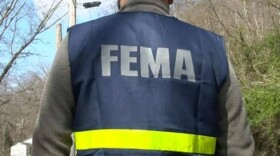The winter holiday rituals are behind us. It's cold and snowy in many places. And, now, unfortunately, another annual tradition is upon us.
"Respiratory season is here," says Dr. Brendan Jackson, an epidemiologist at the Centers for Disease Control and Prevention. "It is getting to be in full swing now with a lot of people getting sick, a lot of people missing work, missing school, just feeling lousy in general."
People tend to travel and get together with family and friends over the holidays. The bad news is that this often means they come home with some nasty bug. And we're in the thick of that again right now.
"It is ugly out there right now," says Katelyn Jetelina, an epidemiologist who writes the Your Local Epidemiologist newsletter.
The flu, in particular, is at high or very high levels all around the country, according to the CDC.
"We're buried with influenza. Things are very, very busy and intense," says Dr. William Schaffner, an infectious disease researcher at Vanderbilt University in Nashville, Tennessee. "The emergency room is full of people who are coughing and sneezing. We've had people waiting on gurneys — those stretchers — waiting for admission. We are really full."
RSV and COVID-19 are rising
And it's not just the flu. RSV is still spreading at very high levels too. And now, COVID-19 is starting to shoot up again.
"Before we had two major viruses causing a lot of hospitalizations and deaths with RSV and flu," Schaffner says. "Even though COVID is no longer at emergency status, it still causes more hospitalizations and deaths than the other two. And so you add that together, each respiratory season on average going forward is going to be worse than it was before the pandemic because of the addition of COVID."
No one knows how bad things could get this winter. The CDC says that unless some more highly transmissible new COVID-19 variant emerges, it still looks like this winter will be like last year.
But that's not great — it still means many children missing school, parents missing work and grandparents and other vulnerable people ending up in the hospital and even dying.
"We've got three viruses that are going to hit with peaks that are going to be relatively closely spaced. So that as one starts to go down, the other's going to start peaking," says Dr. Andrew Pavia, an infectious disease researcher at the University of Utah. "And we're just not going to get a break, like a series of snowstorms. What it means, I think, is we're in for a pretty miserable January before things start to let up."
But even then, there will likely be a long tail, according to Caitlin Rivers, an epidemiologist from Johns Hopkins University who wrote the book Crisis Averted, about pandemics.
"The winter respiratory virus season often peaks in December or January," Rivers says. "But it lingers through the spring months. And so I do think we have several more weeks if not months left of this sick season."
Take precautions, including vaccination
Rivers and others recommend that people wash their hands a lot, mask up in crowded places and, of course, get vaccinated. The flu and COVID-19 shots aren't perfect, but they both still do a pretty good job of keeping people out of the hospital and dying, especially older people and others who are vulnerable. Most people still haven't gotten either of those shots, but it's not too late.
It also can't hurt to get tested to see which bug someone has. New tests available for the first time this year without a prescription let people check at home for the flu and COVID-19. That could help their doctors decide more quickly whether they need antiviral drugs.
All this comes on top of other common infections, according to Dr. Sean O'Leary, a professor of pediatrics at the University of Colorado School of Medicine and chair of the committee on infectious diseases for the American Academy of Pediatrics. For example, mycoplasma pneumonia, which can cause "walking pneumonia," and whooping cough are still spreading widely.
"We're seeing quite a bit of that this year, unfortunately," O'Leary says.
HMPV cases in China aren't unusual
There's also yet another respiratory virus that has been getting attention: the human metapneumovirus (HMPV). That's because China is reporting a surge of HMPV in the north.
But the World Health Organization said Tuesday that the levels of HMPV in China are not unusual or straining the health system.
"WHO is in contact with Chinese health officials and has not received any reports of unusual outbreak patterns," according to a WHO statement. "Chinese authorities report that the health care system is not overwhelmed and there have been no emergency declarations or responses triggered."
Other infectious disease experts say they aren't very worried about HMPV. That virus, which is related to RSV, has been circulating for decades, so many people have immunity against it.
While HMPV can cause serious complications like pneumonia, it usually causes only a cold. HMPV is spreading at low levels in the United States. But experts stress that HMPV does not appear to pose anything close to the threat posed by the flu and COVID-19, which is still killing hundreds of people every week, according to the CDC.
"We're tracking that closely," says the CDC's Jackson of HMPV. "I will say levels here in the U.S. are really at a typical level for this time of year. It's not anything out of whack compared to previous seasons."
Copyright 2025 NPR









